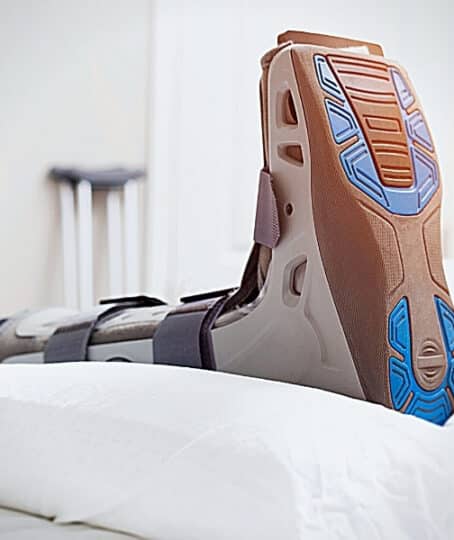
When a Dog Attacks Again and Again If dogs attack once, it’s alarming. When they attack five times, it’s no...


If you’ve suffered from a catastrophic injury, you may qualify for two different kinds of damages to help you recoup your losses and to offset future expenses – compensatory and punitive damages. Your injury attorney will help you understand the different type of damages, and also calculate both losses from expenses already incurred, and future expenses as well.
Compensatory damages are the most common type of damages awarded in catastrophic injury suits. Compensatory damages will include all medical expenses you’ve incurred to date, and will also estimate future medical expenses for the treatment of your injuries and any resulting conditions that are directly related to the injury.

A catastrophic injury is any injury that causes life-changing side effects. These injuries are usually sustained suddenly, and often take the form of a severe injury to the spinal cord, spine, or brain, severe burns, amputations, or organ damage.
If you’ve been in an accident and your injuries fall into one of these categories, a personal injury lawyer in Bloomington may help you understand what is considered a catastrophic injury, and whether you have grounds to sue.
The key factor that links these types of injuries and causes them to be considered catastrophic is the severity of the injury or condition. They typically cause a significant functional disability that is expected to be long-lasting, or even permanent. The effect your injury has now or will have in the future on your quality of life also factors into classifying an injury as catastrophic.
The most common types of injury that can be considered catastrophic, depending on severity, are:
Some spinal injuries are minor, while others are more severe or catastrophic, with lasting effects.
For a spinal injury to be considered catastrophic, it will likely have caused one or more of the following issues:
Each of these issues to varying extents will limit functional ability, earning potential, household contribution, and often place an increased burden on both the injured person and his or her family members.
In addition, severe spinal injuries will likely be accompanied by a lifetime of time-consuming and expensive doctor’s visits and treatment regimens, putting an increased financial burden on the family. Often, in cases where someone has suffered a catastrophic spinal injury, his or her home will need to receive expensive modifications to be an accommodating space.
If you’ve suffered from a paralysis injury, your Bloomington personal injury attorney will be able to give you a more clear picture of what you can expect to recover.
TBI, or traumatic brain injury, can likely cause effects that last a lifetime, including cognitive dysfunction, limited mobility, and speech problems. Some of these limitations can be quite severe and result in a person losing his or her independence for the remainder of his or her life.
Even if you retain some functional ability after a TBI, it could likely limit your ability to continue to work. The loss of income for an injury that can affect you for the rest of your life can be considerable.
When burns received from an accident are severe enough, they can qualify as catastrophic injuries. Typically, burns of this severity are accompanied by infections, chronic pain, and limited mobility, as well as disfigurement.
Severe burns tend to require a long and painful hospital stay, and often are followed by multiple procedures, such as skin graft surgeries, to cover exposed tissue. Frequent infections from open wounds often complicate matters as well.
You’ll likely be out of work and losing income during your recovery from severe burns. If you’re able to return to work, it can be in only a limited capacity, depending on the location of your burns, how much mobility has been compromised, and what kind of work you do. An attorney can help you undestand how to file a lawsuit for chronic pain syndrome resulting from severe burns.
Amputation refers to the surgical removal of a limb or body party. If you have a job that requires you to be on your feet, or use your hands for work, your ability to remain gainfully employed may be affected by your injury.
What you may not have considered, though, is the time you’re going to be spending in therapies, such as physical therapy or occupational therapy, to learn how to perform basic tasks and functions with given your condition. You’ll also likely need to be fitted with new and expensive prosthetic limbs over time as your body changes.
All of these additional expenses, along with the complication of calculating how much of a financial and household contribution impact your injury is going to require, will be more easily argued by an experienced injury attorney.
Organ damage can cause a whole range of problems, and can often be fatal. Even after you’ve survived the initial accident, your life will be irrevocably changed with the loss of or damaged functionality of an organ. Depending on your type of injury and what organs are lost or damaged, you may find yourself unable to function in a normal capacity. This limitation could certainly apply to work, but also in your home life.
In addition to limitations, certain types of organ damage may cause you to need regular medical procedures that are both costly, and time-consuming. Dialysis, blood transfusions, a colostomy, or the need to carry oxygen from lung damage can severely impact your quality of life.
Catastrophic injuries in Bloomington may come from a variety of situations, but some of the most common are:
Automobile accidents, motorcycle accidents, or truck accidents are a common way people are inflicted with catastrophic injuries. Most injuries from these motor vehicle accidents are not considered catastrophic, but the potential exists. If you’ve been in an accident that is the fault of another party, and your injuries meet the criteria for being catastrophic, you may have the option to recover some additional damages.
Most personal auto insurance policies will have a policy limit that will restrict the maximum amount that the insurance company is required to pay in damages. Your attorney will investigate to see if there is another general liability or other applicable policy held in addition to the standard auto insurance in an attempt to maximize your compensation.
If you’ve been hit by a commercial truck, there will be several options available to you and your attorney. You’ll need to put together a list of questions to ask when hiring a truck accident lawyer to ensure you’re hiring the right advocate for your situation. In addition to the driver and his or her insurance policy, you may be able to sue the trucking company that employs him or her, depending on the circumstances of your accident.
Workplace accidents can be the cause of several types of catastrophic injuries. Depending on the type of industry you work in, this could include spinal injuries, brain injuries, amputations, or even organ damage due to workplace conditions.
Your employer may do everything in his or her power to make it seem as if the workplace accident was your fault, rather than conditions at the facility or another employee, in order to limit liability. It’s important you have a competent attorney on your side during this process to help you recover the benefits to which you are entitled.
Construction accidents could cause any number of injuries considered to be potentially catastrophic. An inattentive crane operator may swing into or drop an object onto another worker. A retaining wall may give way during concrete placement, or it could even be a matter of a scaffold collapsing onto a sidewalk, and you just happened to be walking down the wrong street and exactly the wrong time.
General Contractors keep a general liability policy on all of their job sites, in addition to a myriad of other policies, for this very reason. Your attorney will know what questions to ask, and who to ask them of, to find out what you may potentially recover in damages.
Spinal injuries and brain injuries, are the most common types of catastrophic injuries that may occur as a result of a fall. If your fall was caused by neglect or is otherwise the responsibility of someone else, it’s reasonable to expect that he or she will make you whole financially. Ask your attorney about his or her recommendations for you going forward, if you decide to file suit for your injuries sustained in a fall. He or she will have specific instructions for you to follow to maximize your chances of a successful settlement or jury trial lawsuit.
Medical mistakes and faulty medical equipment can be responsible for the entire range of potentially catastrophic injuries, from patient identification errors causing the wrong person to have a limb amputated to incorrect medication causing organ damage. Medical mistakes may even be a failure to follow protocols causing oxygen starvation and a brain injury, or a slip of the hand during a spinal procedure.
You’ll need to find out if your injury attorney has medical malpractice experience if these are the types of injuries you’ve incurred. Your attorney will need to approach the case differently and use additional expert witnesses for investigation and testimony when dealing with medical mistakes.
If you’ve suffered from what is considered a catastrophic injury, you may qualify for two different kinds of damages to help you recoup your losses and to offset future expenses – compensatory and punitive damages. Your injury attorney will help you understand the different type of damages, and also calculate both losses from expenses already incurred, and future expenses as well.
Compensatory damages are the most common type of damages awarded in catastrophic injury suits. Compensatory damages will include all medical expenses you’ve incurred to date, and will also estimate future medical expenses for the treatment of your injuries and any resulting conditions that are directly related to the injury.
Other types of damages are also included in the compensatory category. Some of these are lost wages, loss of future earnings if you will be unable to work for an extended period of time, loss of household services, loss of quality of life, cost of additional care, pain and suffering, or shortened life span.
Illinois also allows for punitive damages in certain cases where specific requirements are met. When the defendant engages in conduct with evil motive, or with a reckless and outrageous indifference to a highly unreasonable risk of harm and with a conscious indifference to the rights and safety of others, the state will allow punitive damages to be awarded.
Naturally, proving that your injuries came as a result of such evil motive or reckless indifference will be an additional challenge for you as the plaintiff. That’s why it’s important for you to carefully question your potential attorneys to ensure that they have the right skill set and a consistent track record in similar cases. Your attorney will be the greatest tool in your arsenal when it comes to maximizing the damages you are awarded.
If you’ve suffered what is considered a catastrophic injury in Bloomington, the first step you need to be taking after your initial medical treatment is to interview and hire an attorney. You will need to make sure you are hiring an experienced professional who has a proven track record on similar cases. Many attorneys specialize so that they can provide a more thorough level of expertise to a given subject, and that’s what you’ll likely need in this case.
Make sure you have a list of questions ready to ask the attorney and be prepared to follow his or her advice. You’ll need to ask questions about the type and amount of damages you can expect, but make sure you also ask questions about how to behave, what to say, and who to talk to going forward.
Your lawyer’s advice to you in these areas and regarding what is considered a catastrophic injury is invaluable. He or she will have a familiarity with what you’ll be facing during the process, including any tricks the defense may try in order to make your injuries look less serious than they are, or that they don’t impact your life as severely as you claim.

When a Dog Attacks Again and Again If dogs attack once, it’s alarming. When they attack five times, it’s no...

Overview of the Personal Injury Claim Process in Illinois No one expects to suffer an injury or get involved in...

Exploring Caps on Damages in Illinois Personal Injury Cases Illinois does not have laws capping damages in successful personal injury...